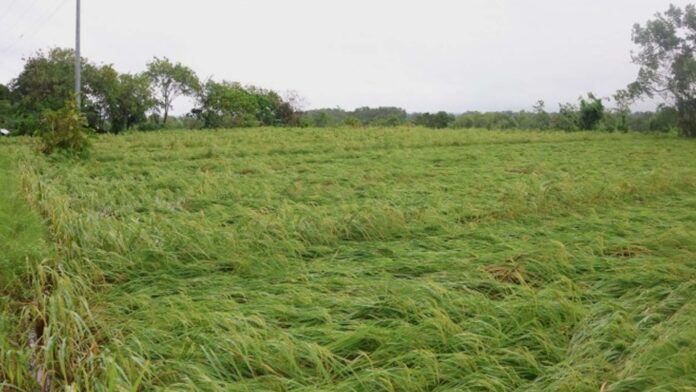The Department of Agriculture (DA) assured Friday that assistance to affected farmers will be expedited to allow for quick recovery following the onslaught of Severe Tropical Storm Kristine (Trami).
“Nagbigay na ng instruction si Secretary (Francisco Tiu Laurel Jr.) sa ating mga regional field offices, dito sa ACPC (Agricultural Credit Policy Council), sa PCIC (Philippine Crop Insurance Industry), at sa lahat ng concerned offices, especially sa mga regional field offices natin, to expedite ‘yung pagbibigay ng tulong sa ating mga magsasaka at mangingisda na apektado ng bagyong Kristine at makakaasa kayo ng tuluy-tuloy na suporta (The Secretary has instructed all our regional field offices, ACPC, PCIC, and all concerned offices, especially the regional field offices, to expedite the release of aid to all farmers and fishers affected by Kristine, and they can expect continuous support),” DA Assistant Secretary Arnel de Mesa said in a Zoom interview.
For affected areas, he said the DA has prepositioned PHP80.21 million worth of agricultural inputs, including seedlings of rice, corn, high-value crops, drugs, and biologics; PHP500 million loanable fund under the Survival and Recovery Loan of the ACPC; P500 million quick response fund; fuel subsidy; and available indemnification for insured farmers under the PCIC.
“The Secretary has committed additional PHP1 billion na ire-request natin sa (that we will request from the) DBM (Department of Budget Management) para doon sa tinatawag na rehabilitation effort para sa mga lugar na naapektuhan under pa rin sa ating (for the rehabilitation effort on affected areas, still under our) quick response fund,” De Mesa said, citing its possible release in November or later within the year.
As of Thursday, the DA-Disaster Risk Reduction and Management Operations Center reported PHP80.80 million worth of agricultural damage in rice, corn, high-value crops, and livestock, with the rice sector being the hardest hit.
At least 2,864 farmers were affected in the Cordillera Administrative Region, Mimaropa, Bicol and Western Visayas.
Rice, other commodity prices
De Mesa, meanwhile, assured a stable retail price of rice despite the projected decline in local palay production.
He said the decision of President Ferdinand R. Marcos Jr. to reduce the tariff on imported rice from 35 to 15 percent has been significant in managing the overall supply and preventing spiking retail prices.
“Imagine niyo, kung mataas pa rin iyon (tariff) tapos ngayon, mayroon tayong problema na ganito, limited iyong local production tapos ang darating na bigas ay mahal, tapos mahal pa ang taripa, talagang sisipa ang presyo (Imagine if the tariff is still high and we now have a problem like the limited local production and then the incoming rice supply is expensive under higher tariffs, the prices will really surge),” De Mesa said.
As of Wednesday, the prevailing price of local regular milled rice is pegged at PHP41 per kilogram to PHP50/kg, and PHP43/kg to PHP54/kg for local well-milled rice; while imported regular milled rice ranges from PHP42/kg to PHP48/kg, and PHP45/kg to PHP55/kg for imported well-milled rice.
De Mesa said vegetable supply delivery and logistics already resumed in most areas with roads now passable.
He, however, mentioned a possible 10 to 15 percent increase in the retail price of vegetables.
To date, an initial PHP106,990 worth of damage in high-value crops was recorded in Oriental Mindoro.
For fish prices, De Mesa said the ongoing arrivals of imports would help ensure stable market prices.
Around 30,000 metric tons of imported fish are expected to arrive in time for the closed fishing season every Nov. 1 to Jan. 31, according to the Bureau of Fisheries and Aquatic Resources. (PNA)






